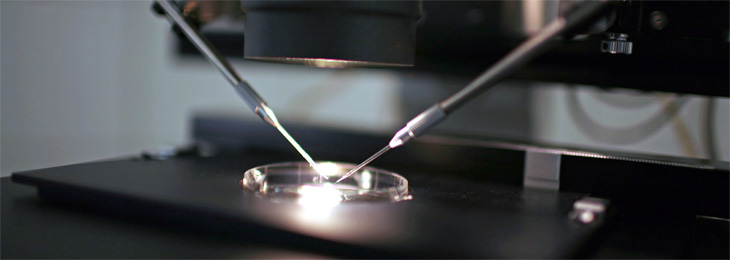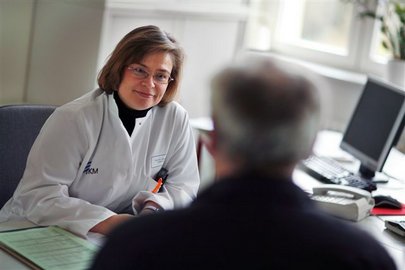Infertility - unwanted childlessness
The causes of the inability of a woman to conceive are distributed equally between men and women. We offer comprehensive personal advice, diagnostics and therapy in cases of restricted male fertility.
The specific diagnostics comprise:- Epigenetic and genetic diagnostics
- Ejaculate analysis in accordance with criteria of the World Health Organisation (2010)
- Histology
In close cooperation with the gynaecologists at our University Fertility Centre (Medical Management: Associate Professor Dr. Andreas Schüring), all forms of fertility treatment are carried out.
- Intra-uterine insemination
- In-vitro fertilisation
- Intra-cytoplasmatic sperm injection
The technical equipment in our IVF laboratory allows highly qualified therapies (e.g. ICSI microscope, including laser for motility tests and polarisation filter for the improved morphological and functional
assessment of the cells).
Erectile dysfunction
Sexual dysfunction in men has many causes and severely limits the quality of life. At our centre we offer comprehensive advice, diagnostics and all treatment options for erectile dysfunction.
Special diagnostics:- Examination of the penis, including the cavernous body and blood vessels
- Cavernous body testing
- Cavernous body injection
- Instructions on the use of erection aids
- Hormone replacement therapies
- Penile prosthesis implantation
- Provision of contacts with specialised psychologists and psychotherapists
Penile deviations (= curvature) can be congenital or acquired as a result of Peyronie's disease and limit or prevent intercourse. We offer thorough consultation, diagnostics, conservative therapies and, if necessary, corrective surgery for penis straightening.
Hormonal imbalances - testosterone deficiency
Permanent testosterone deficiency in the adult male can lead to sexual dysfunction and promote accompanying diseases (diabetes mellitus, hypercholesterolaemia, osteoporosis, anaemia, depression). The causes can be varied. We offer the full range of diagnostic evaluation and therapy.
Special diagnostics:- Hormone tests, genetic diagnosis of the testosterone sensitivity of the male body (CAG triplets - androgen receptor)
- Introduction and monitoring of hormone replacement therapy with testosterone
- Indirect testosterone substitution by gonadotropin therapy for infertility
Severe congenital hormone deficiency disorders (e.g. Kallmann syndrome, idiopathic hypogonadotropic hypogonadism) require careful evaluation and therapy, which can be performed on the basis of our long-standing experience according to the relevant scientific findings. Here we offer close cooperation with the Institute of Human Genetics (Medical Management: Prof. Dr. Wieacker).
Adolescents may be affected by delayed or failed puberty (Pubertas tarda). Here, a thorough investigation into the causes is imperative. Treatment is carried out in close cooperation with other departments at UKM.
Operative andrology
We offer the full range of andrological surgery – using microsurgical techniques under the surgical microscope if necessary and if it makes sense. Most operations can be performed on an outpatient basis. Before an operation, an extensive personal consultation takes place with regard to the surgery and anaesthesia at our Centre.
Operations on testes and epididymides- Micro-surgical testicular sperm extraction (M-TESE)
- Micro-surgical epididymal (= from the epididymis) sperm aspiration (MESA)
- Diagnostic testicular biopsy for histological examination, in particular the exclusion of testicular intra-epithelial neoplasia (TIN)
- Inguinal (= through the groin) orchiectomy in the case of a testicular tumour and TIN
- Testicular prosthesis implantation
- Resection of hydrocele and spermatocele
- Orchidolysis and orchidopexy
Surgery on the spermatic cord- Microsurgical varicocele operation
- Vasectomy (sterilisation) upon completion of family planning
- Microsurgical vasovasostomy or vasoepididymostomy (vasotubulostomy)
(refertilisation)
Surgery on the penis- Correction of penile deviations (using the procedures of Nesbit, Schroeder-Essed, with patch if necessary)
- Implantation of cavernous body prostheses
- Circumcision (radical, plastic), frenulotomy (transection of the foreskin frenulum)
Second opinion on testicular tumour
Professor Kliesch is a member of the Urological Section of the German Testicular Tumour Study Group (GTCSG). We offer the men affected a review of the therapy planned and provide guideline-based recommendations for treatment.
Cryopreservation of sperm/stem cells
Male fertility can be permanently restricted by various treatments of serious diseases (cancers, especially testicular tumours, leukaemias, Hodgkin's disease). It is therefore important to take precautionary measures so that a subsequent wish to have children can be fulfilled. The freezing (cryopreservation) of a semen sample prior to the planned treatment ensures that it will be possible to fulfil a subsequent desire to have children. Men and adolescents, from the time from which they are able to ejaculate, should take advantage of this opportunity. Testicular tissue can also be permanently frozen. With the sperm from the tissue it is subsequently possible to carry out fertility treatment.
Initial scientific studies show that it may be expedient to take samples of testicular tissue, even from children, before cancer therapy, so that in the future stem cells from the tissue can be used to fulfil the child's own wish to have children. We will be pleased to offer you a detailed discussion on these issues.
Klinefelter's syndrome
Klinefelter's syndrome is the most common chromosomal disorder in men and affects approximately 1 in 500 men. Men who are affected often suffer from hormonal imbalances and restricted fertility. On the basis of our extensive scientific work on Klinefelter's syndrome, we are able to provide men who are affected with comprehensive advice and the latest treatment options.
Only in recent years has it become known that in men with Klinefelter's syndrome, it is also possible to detect sperm by means of testicular microsurgery. We will be pleased to offer you a detailed discussion on these issues and provide you with our sex education film.









